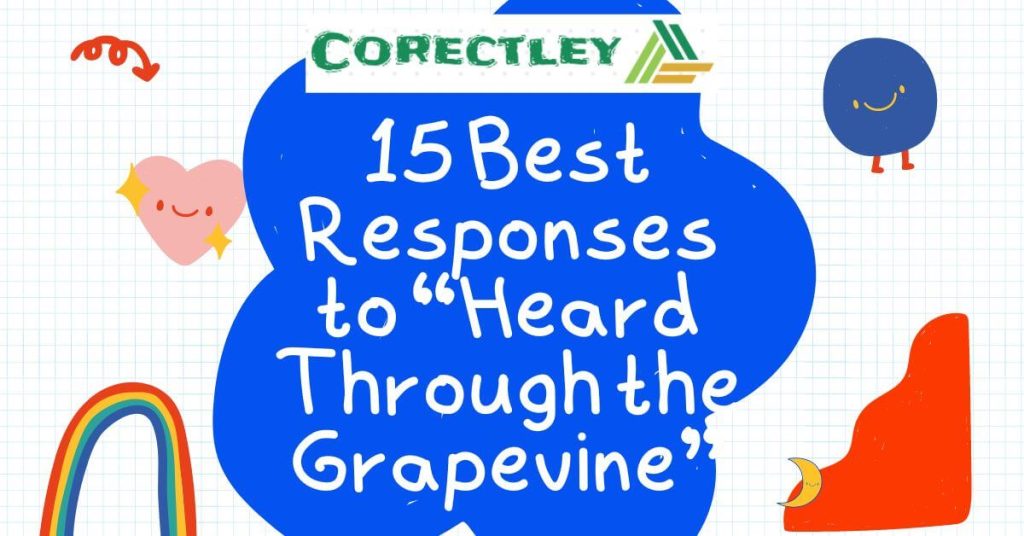Grapevine tattles and chatterboxes! Might it be said that you are worn out on utilizing the normal, worn-out phrases again and again? Have you been trapped in a discussion groove, continuously returning to “heard from another grapevine” as your go-to chatter starter?
The saying communicates hearing news from somebody who heard the news from another person. In any case, imagine a scenario where you want an elective expression.
Probably the best elective expressions to use for “heard through the grapevine “word in the city,” “supposedly,” “buzz in the air,” “bigmouth expresses,” “as per gossip,” and “murmurs in the breeze.” These expressions pass on a comparative thought of getting data casually.
In the remainder of this article, I’ve accumulated a delicious rundown of elective expressions to keep your discussions now and enliven your regular chatter.
However, before we can proceed, we need to agree on the actual meaning of the idiomatic expression.

What does “heard through the grapevine” mean?
“Heard Through the Grapevine” is a colloquial articulation you use to impart data from an unsubstantiated source.
The right use of this articulation is the point at which you mean to offer something reputed, which gets an opportunity of being bogus or valid.
The beginning of this expression is fascinating. The informal articulation comes from the hours of the American Nationwide conflict. At that period, bits of hearsay were many times spread using transmit lines.
They frequently responded, “I heard it through the grapevine,” when asked if a story was true.
From that point forward, “Heard Through the Grapevine” has been a non-literal articulation to underline such a circumstance. Furthermore, presently, it is becoming abused.
Here are other intriguing elective expressions like “Heard Through the Grapevine.”
15 phrases like “heard through the grapevine.”
To be clear, the best way to replace “heard through the grapevine” in writing is to convey the idea of hearing rumors, learning something informally, typically verbally, or hearing some news from someone who heard it from someone else.
1. Rumor has it…
“Rumor has it” is one of the normal equivalents for the colloquial expression “heard from the grapevine,” as the two of them mean a similar thought.
Hearing from the grapevine is a figurative articulation proposing that you heard something.
Thus, you can utilize this elective expression to commute home with a similar importance. It is the most ideal choice while conveying in a conventional climate or setting where “heard from the grapevine” may not be perceived by everybody.
2. The word on the street
Another well-known idiom is “Word on the street.” You use it when you pass on data that has no authority or irrefutable source except for what has turned into a loosely held bit of information to people in general.
This straightforwardly connects to the importance of “heard through the grapevine” thus it is an ideal substitute for the last option.
3. Word has it…
Rather than over and overexpressing “heard through the grapevine,” which may not be far-reaching for each audience or per user, you can utilize “word has it that… ” since the two expressions mean the same thing.
“Word” in this expression implies data coming from tattle or hypothesis from the public that might be valid – similarly as you have it with “heard through the grapevine.”
4. Heard it in the wind
Although it deviates slightly from the message, the substitution of “heard it on the wind” for “heard through the grapevine” is an excellent alternative.
“Heard it on the breeze” is likewise a colloquial articulation, yet the linguistic application in the sentence is to say the data is in the breeze.
By and large, it implies people are discussing it, and it might work out, yet nobody is certain.
5. A little bird told me
“A little bird told me” is another expression you can use to supplant “heard through the grapevine,” particularly when you’re resolved to not uncovering the wellspring of your data.
“Heard from other people” is frequently used to demonstrate that you realize something but decide to keep quiet.
On the off chance that this is the setting of the utilization, “a secret someone told me” is the best other option.
6. The scuttlebutt has it
Scuttlebutt is another word (read: slag) for tattle.
This elective expression is best utilized when the data you convey might be valid.
The beginning of this specific saying originates from the nautical term for the container used to serve water A Naval force Scuttlebutt.
It is a somewhat famous expression like “heard through the grapevine”; chances are, you’ve heard it being utilized previously.
7. The rumor mill
“The rumor mill” signifies when bits of hearsay and tattle start and flow among a gathering.
So it straightforwardly associates with the message of “hearing through the grapevine” because, in this light, no data is 100 percent checked.
8. Whispers on the breeze suggest that…

“Whisper on the breeze suggests that…” This is another succulent informal articulation you can use rather than “heard through the grapevine,” particularly when you need to bring an assortment of word decisions in with the general mish-mash.
At the point when you stretch on a subject of talk, hypothesis, or tattle, continuing to rehash “heard through the grapevine,” so you can utilize “whistler on the breeze propose that can be tedious,”
It is likewise a superb choice to utilize when you expect to keep the wellspring of your data hidden. In such a case, you figuratively present your source as a “murmur on the breeze.”
9. The word around town is…
Word in and out of town implies far-reaching data across the city, paying little mind to how valid or bogus it is.
Another way to say you heard something through the grapevine.
This English idiom is used to talk about something that a lot of people are talking about.
Very much like “heard through the grapevine”, this comparable expression is normally connected with bits of gossip.
10. People are saying that…
Assuming that you want an expression to use rather than “heard through the grapevine” that isn’t an informal articulation, then you can say, “persons are saying that… “
This expression is a free translation of “heard through the grapevine “. It is direct and reasonable for anybody with fundamental English language information.
You utilize this elective expression, particularly while composing a business letter or text, and you can’t communicate it with phrases.
11. The latest buzz is that…
If another improvement isn’t openly known at this point, you can utilize “heard through the grapevine” to let the cat out of the bag.
However, “the latest buzz” will be an excellent alternative to the idiom in this setting.
“The most recent buzz” in English is shoptalk which recommends another turn of events, like an item, regulation, change, redesign, occasion, or person that has surfaced.
On the off chance that the realities are not confirmed, it is as yet a buzz until it is demonstrated as a genuine article.
12. I caught wind of…
“I caught wind of (an information)” implies that you caught wind of it, particularly when another person is concealing it from you.
It’s a casual way to say that you’ve realized something you’ve deliberately kept hidden over time.
While “heard from the grapevine” is an extraordinary method for passing on the message, an elective expression to make the declaration is to say, “I found out about… “
13. The word going around is…
Talk is a word circumventing that might be valid. So one more method for expressing heard through the grapevine” is to straightforwardly specify the significance of the colloquialism — tattle, and tales.
“The word going around is… ” This is one more comparative expression to ” heard through the grapevine” since the two of them mean the same thing.
14. According to the latest whispers…
Most recent murmurs are one more approach to saying talk or tattle available for use. In any case, so it is recommended that your source is unsubstantiated yet news.
It is a magnificent substitution for “heard through the grapevine” since it conveys a similar significance.
Utilizing “according to latest whispers” signifies the data you’re sharing is gotten from tattle in and out of town and could be valid.
15. Smoke around the campfire…
Smoke around the campfire is another seldom utilized colloquialism that can supplant ” heard through the grapevine.”
The historical backdrop of these two informal articulations is indistinguishable and implies the same thing.
Smoke, in this unique situation, alludes to chatter or data, while pit fire alludes to the town, local area, work environment, school, or church where the tattle is coursing.